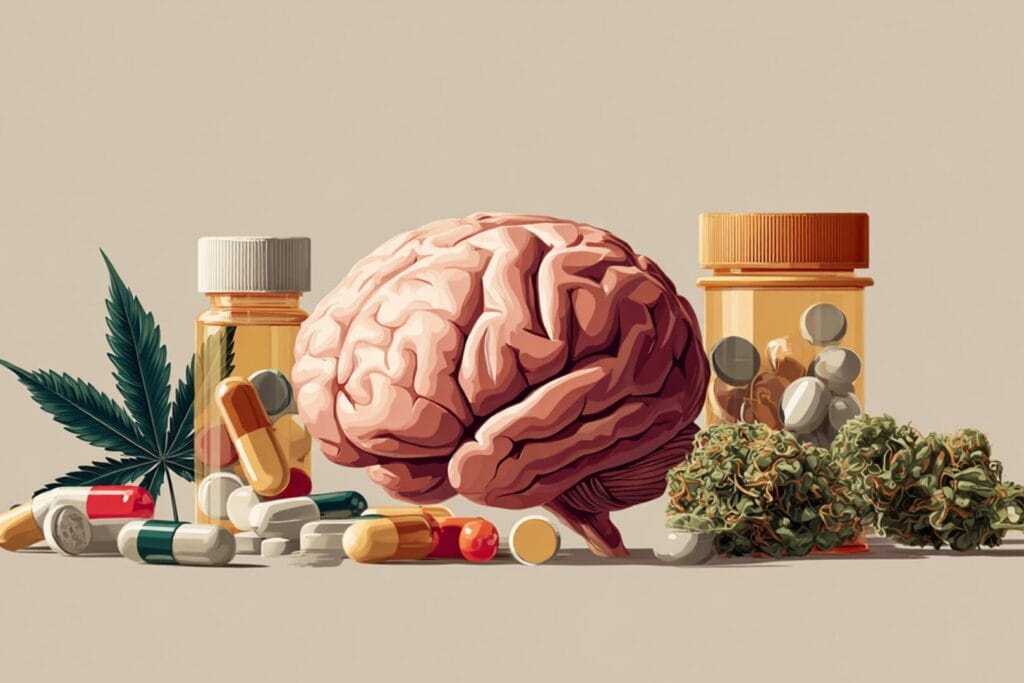What Is Ambien?
Ambien is a brand name for a medication known as zolpidem. This medication calms the central nervous system and works by affecting certain chemicals in the brain to help treat insomnia. However, it may also be prescribed to treat anxiety and some other conditions in adults.
Not taking the substance as prescribed may cause Ambien withdrawal symptoms when attempting to detox. Ambien belongs to a class of medications called benzodiazepines, which have a high potential for dependency and addiction. The likelihood of this increases with prolonged use.
How Is Ambien Taken?
Ambien is usually taken orally and is typically prescribed for short-term use, usually for 7-10 days. It is used for short periods to prevent dependence. This means that if you were prescribed zolpidem and you used it for long enough, you may need more of it to achieve the same effects.
Also, if you were to stop taking the medication abruptly, you would likely experience Ambien withdrawal symptoms.1
Ambien Withdrawal Symptoms
Ambien withdrawal symptoms may be mild, moderate, or severe. It is important to follow the dosage instructions carefully, as taking more than prescribed can increase the risk of dependence, tolerance, and withdrawal symptoms.
Ambien is a controlled substance and can be habit-forming, which is why it should only be used as directed by a healthcare provider. If you or a loved one is experiencing Ambien withdrawal symptoms, you should read on to learn how to get help.
How Does Ambien Affect the Body?
Ambien belongs to a class of sedative-hypnotics called benzodiazepines, or “benzos” for short. Simply put, these medications affect your brain and body by calming it down to induce sleep. The mechanism of action of Ambien involves its interaction with gamma-aminobutyric acid (GABA).
This is an inhibitory neurotransmitter that helps to regulate brain activity and reduce anxiety and tension. When GABA binds to its receptors, it can decrease the activity of neurons and induce feelings of relaxation and sleepiness.
How Is Ambien Prescribed?
Due to its short half-life, Ambien is rapidly metabolized and eliminated from the body. Consequently, it is preferred for use in short-term treatment for insomnia.2
When used for longer periods at higher doses, the risk of dependence and Ambien withdrawal symptoms increases. This is why it should only be used according to the prescription. Then, it should be stopped accordingly.
If side effects still continue, your doctor may choose to give you another prescription.
Dependence and Ambien Withdrawal Symptoms
Dependence is a major concern when using medications like Ambien. If an individual uses them for too long, their body can get too familiar with the medication. At this point, individuals may develop a dependency on the substance.
It may also cause someone to experience Ambien withdrawal symptoms. These will be detailed below.
What Are Ambien Withdrawal Symptoms?
Ambien withdrawal symptoms can occur within a few days to a few weeks or months after stopping Ambien. Symptoms may include:4
- Rebound Insomnia: Your insomnia may become worse than it initially was when you stop Ambien after prolonged use.
- Anxiety and agitation: Ambien withdrawal symptoms also include anxiety and agitation.
- Irritability: You may become more sensitive to sound, light, and other aspects of your environment.
- Muscle cramps: You may experience muscle pain and stiffness after stopping Ambien.
- Tremors and shaking: Some people may experience tremors or shaking during Ambien withdrawal. This symptom can be seen in various parts of the body, but mostly in the hands.
- Sweating and chills: This is a common withdrawal symptom associated with medications that affect the brain.
- Nausea and vomiting: Gastrointestinal disturbances also feature among the Ambien withdrawal symptoms.
- Headaches: People have reported mild to severe headaches after stopping Ambien. It’s best not to mix painkillers and Ambien if you are experiencing headaches, however.
- Seizures: In rare cases, Ambien withdrawal can cause seizures, especially if the drug has been used for an extended period at high doses.
How to Reduce Ambien Withdrawal Symptoms
It’s important to seek professional help when discontinuing Ambien use to minimize the risk of Ambien withdrawal symptoms and ensure a safe and comfortable transition off the medication. Also, only use Ambien only as directed by a healthcare provider.
You should avoid taking higher doses than prescribed, and not take the medication for longer than recommended. The severity and duration of Ambien withdrawal symptoms can vary depending on several factors, such as the duration and dosage of use, individual factors, and other medications or substances used.
What Are the Health Risks of Ambien Use?
Caution is necessary when dealing with medications that alter brain or nervous system function. Misuse or prolonged use of Ambien poses potential health risks, including Ambien withdrawal symptoms. Some other risks may include:
Dependence and Addiction
This is a major reason for short-term use of Ambien, since it belongs to a class of medications that are known for their potential to be habit-forming. It is a controlled substance that can only legally be obtained with a prescription.
Withdrawal Symptoms
If you stop this medication after prolonged use, you may experience Ambien withdrawal symptoms. These symptoms range from mild to severe and can affect your life adversely. Some of these symptoms include seizures, rebound insomnia, and psychosis.
Cognitive Impairment
Ambien affects the central nervous system, which is necessary for proper functioning. It is supposed to help you relax and sleep. However, it can present a problem if it sedates you when you need to be alert. Prolonged use can impair memory, attention, coordination, and other cognitive abilities.3
Behavioral Changes
Since Ambien affects your brain, it may influence your behavior in ways that you do not expect. Some people can have issues focusing or making correct judgments. Others may also experience hallucinations or some other extreme behavioral changes.
Respiratory Depression
This is a side effect of Ambien’s calming nature. It can become a problem where one’s respiratory capacity is compromised. For example, caution is needed where there is a pre-existing respiratory condition.
Ambien should not be co-administered with other drugs that depress the nervous or respiratory system.
Allergic Reactions
Some people are allergic to Ambien or to the ingredients contained in its formulations. These reactions are rare but can lead to swelling of the tongue, throat, lips, or face, difficulty in breathing, or hives.
How to Manage Ambien Withdrawal Symptoms
Ambien withdrawal symptoms can influence the quality of your life. It is important to consider options to help you recover properly. Home detox can be effective; however, most people get the best and most long-lasting results with professional help.
Home Detox Tips
While professional help is valuable, individuals may also benefit from some home remedies when dealing with Ambien withdrawal symptoms. These tips can improve the quality of the results you get from professional help. Here are some home detox tips to help you manage your symptoms:
- Regular sleep times: You can restore your sleep cycle to normalcy by going to bed and waking up at the same time every day. This can reduce the occurrence of rebound insomnia and improve the quality of your sleep.
- Sleep preparation: The quality of your sleep improves with certain preparation measures. You can also avoid operating gadgets and limit alcohol and caffeine consumption up to an hour before bed.
- Regular exercise: Quality exercise improves your blood flow and helps you to deal with stress and anxiety. It has been shown to improve sleep quality.5
- Staying hydrated: Vomiting and sweating are among the major Ambien withdrawal symptoms. They lead to dehydration and increase agitation and anxiety.
- Healthy diet: When you improve the quality of your diet, your energy levels and the quality of your sleep Improve. Your diet should include lean proteins, whole grains, and a lot of fruits and vegetables.
- Relaxation techniques: Relaxation techniques like mindfulness, deep breathing, and yoga help you to manage stress and handle Ambien withdrawal symptoms better.
Home detox tips are valuable when combined with professional help.
Professional Detox Center
Professional care is the safest and most effective way to manage Ambien withdrawal symptoms. When searching for a detox center, consider the following:
- Talk to your physician: Your general physician can direct you to professional help for Ambien withdrawal symptoms.
- Insurance coverage: Many centers work with insurance providers to make their services more affordable.
- Research: You can conduct online research to find a reputable center with an experienced team. You also want to see if they have any certifications and accreditations.
- Location: Your detox center should be accessible to you and your loved ones. Support from loved ones is essential during recovery.
- Individualized treatment: Your detox center should be committed to providing services that satisfy your needs. This is achieved by tailoring their offerings to you rather than using a blanket approach.
- Amenities: it is easier to work through Ambien withdrawal symptoms in a conducive environment. Your detox center should have essential amenities and excellent accommodation services.
- Aftercare: Aftercare improves the quality and longevity of your recovery. Look for a center that has provisions for this including support groups, therapy, and check-ins.
Professional help improves your chances of recovering successfully from Ambien withdrawal symptoms.
What Are the Benefits of Treatment Following Detox?
Aftercare is often necessary after recovering from Ambien withdrawal symptoms. It involves resources and ongoing support to help individuals maintain sobriety and prevent relapse after completing detox treatment. Some benefits of aftercare following treatment of Ambien withdrawal symptoms include:
- Ongoing support: This includes support groups, individual therapy, and other resources that can help you cope with the challenges of recovery.
- Relapse prevention: You can learn new coping tools and strategies to manage risk factors in aftercare. Aftercare also allows you to identify early signs of a relapse and seek help on time.
- Treat underlying conditions: Aftercare helps to identify underlying conditions that may have caused or exacerbated substance use symptoms. When these issues are resolved, the quality of your life is improved and the risk of relapse is reduced.
- Education: Aftercare provides continued education and information about addiction, recovery, and relapse prevention.
- Accountability: Aftercare provides you with a sense of accountability and responsibility for your recovery and sobriety.
- Improved quality of life: Aftercare can improve your overall quality of life by providing you with the support and resources that you need to maintain sobriety and lead a healthy, fulfilling life.
Importance of Aftercare
Aftercare following treatment of Ambien withdrawal symptoms reduces your risk of a relapse. It also improves the quality of your recovery and life. Therefore, your detox program should include this for better results.
Help With Ambien Withdrawal Symptoms at San Diego Detox
Ambien withdrawal symptoms are usually associated with discontinuing Ambien following its use for treatment. Therefore, Ambien detox is a little different from what you may expect with other substances.
Consequently, you want to get the best help you can from experienced professionals toward your recovery.
Why Choose San Diego Detox for Your Recovery?
San Diego Detox is a full-service detoxification center located in San Diego, California. We provide top-tier, tailored detoxification services 24/7 for our clients using evidence-based methods and treatments.
Treatment Opportunities
We know that every patient is different, which is why our approach begins with a clinical evaluation. This allows us to map out needs and problem areas for effective detoxification and therapy. Our treatment modalities include:
- 12-step model
- Art therapy
- Cognitive behavioral therapy (CBT)
- Dialectical behavioral therapy (DBT)
- Family system approach to treatment
- Holistic therapies
- Dual diagnosis treatment
How Can San Diego Detox Help With Ambien Withdrawal Symptoms?
At San Diego Detox, you can get the help you need to be free from Ambien withdrawal symptoms. In addition, we are committed to improving the quality of your recovery and life with accurate recommendations for aftercare.
Your detox is one call away. Get in touch with us today for the personalized care and support you deserve.
Professional help improves your chances of recovering successfully from Ambien withdrawal symptoms.






